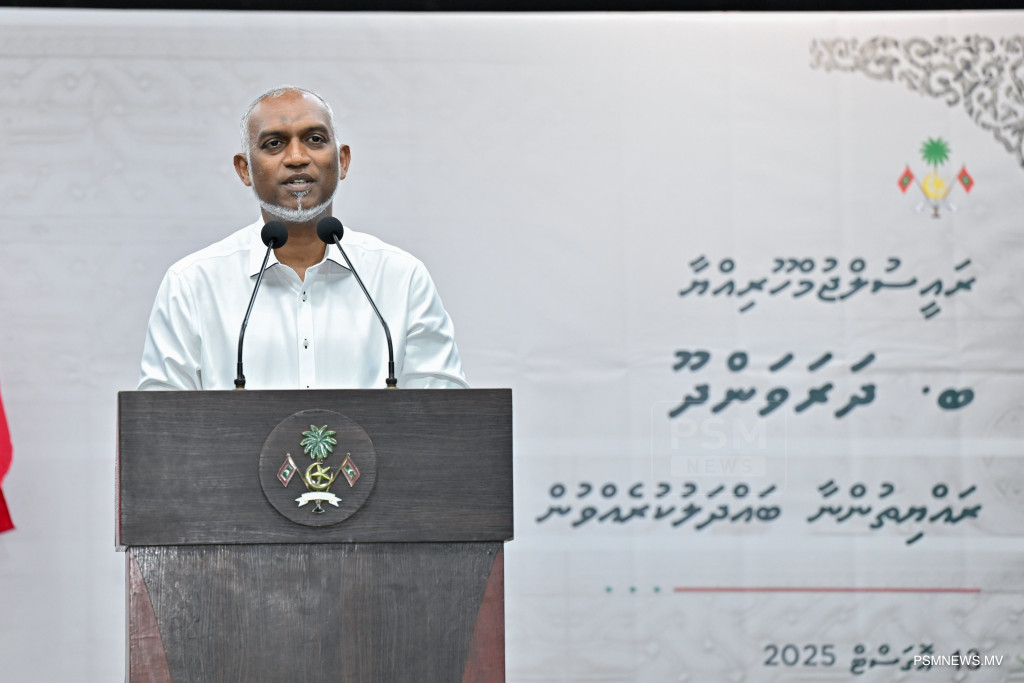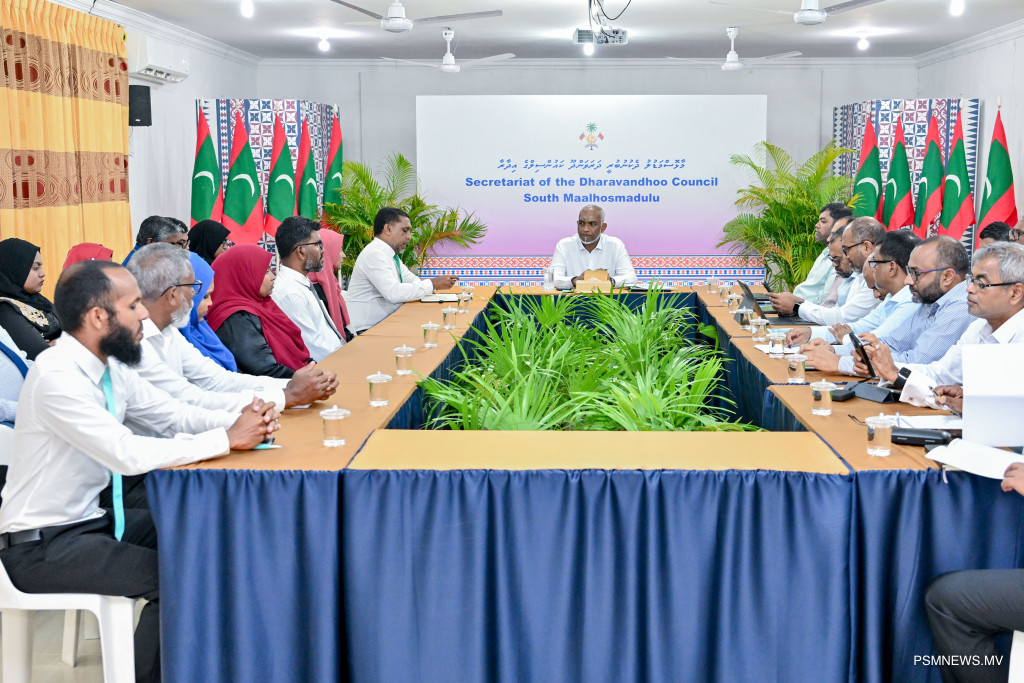
President Dr Mohamed Muizzu has stated that the decision to amend the Decentralisation Act was intended to empower and enrich the people. He made the statement while addressing the residents of Dharavandhoo, Baa Atoll, during his visit to the island as part of his ongoing tour of inhabited islands of the Atoll.
Some island councils have expressed the view that the latest amendments to the Decentralisation Act are intended to deprive the people of their powers. Such remarks have created confusion among the public. Addressing these concerns, the President provided a detailed explanation of the amendments during his speech.
Speaking on these amendments, the President said his government is working with the people, and that the assurance is important in fulfilling the aspirations of the people. Therefore, he travels to inhabited islands across the Maldives and to meet directly with the island councils and institution heads, personally provide this assurance, he said. The meetings givs the opportunity to each institution to share its needs. After exchanging information with community leaders through Cabinet ministers and heads of companies, he then meets with the island residents to confirm their needs, he added. He further stated that he did not believe it was acceptable to ask councils and institutions to travel to Male’ to meet him.
The President asserted that he fully believes in decentralisation, and acknowledged attempts by some to present amendments to the Decentralisation Act as an effort to obstruct initiatives for the people. He emphasised that councils should be run in a way that ensures benefits reach and empower the people, and said the amendments passed by the Parliament are in the interest of the people.
Referring to the first amendment, the President explained that some local authority companies established by councils run small businesses that are already operated by private individuals on the island. The President said that this hinders the prosperity of ordinary citizens.
“One amendment is that small businesses already run by island citizens cannot be run by local councils. Local authority companies should make investments of at least USD 648,500. If the investment exceeds this amount, they can do business in any sector they desire. They must use the revenue generated to provide services for the people,” President said.
The President noted that many councils charge rent for land providing public services to the people, including high rents for buildings providing water, electricity, sewerage and other public services. Therefore, the second amendment to the Decentralisation Act prohibits charging rent for public service land, as this rent increases the cost of services provided to the public.
The President also pointed out that while the law offers councils many avenues to generate revenue, it clearly states that if they operate businesses, they must pay taxes. However, he said councils do not pay taxes on business income. These are taxes levied by the government to fund public services, he reminded.
“Therefore, we are bringing an amendment to make income tax compulsory. It is also an amendment to empower the people,” he said.
The President further highlighted that many councils do not disclose their revenue and finances to the people, or even to the Local Government Authority (LGA). Therefore, the fourth amendment to the law requires elected councillors to share income and financial data with the LGA, he said.
“This is not something that should even have to be written in the law. However, it had to be added due to non-disclosure. That is the next amendment we brought. How is this considered constricting the people’s power or the councils?,” he asked.
The President said when elections loom ahead, some councils neglect their responsibility by renting out land and hiring several people on a contract basis to achieve political goals. He emphasised that island development plans should be shared with residents and receive their approval, and noted that some councils suddenly launch initiatives that are not included in the plan.
The President said these are important reforms to strengthen and champion the decentralisation system. The decentralisation system is one that is accepted by the government and it hopes to fully implement, he noted, adding that amendments aim to further develop the system. However, statements by some councils are misleading, and these statements may possibly be due to their lack of understanding of the changes, he said.
President Highlights Council’s Role in Supporting the Decentralisation Act
The President said that responsible public service is about setting aside political ideologies and recognising that all citizens are equal. Councils must cooperate fully with the government, even if it does not share its political ideology. If they do so, the presidential pledges will be fulfiled at a faster pace, he said, adding that he will not allow political differences to interfere with serving the people.
Meeting with Community Leaders

Earlier in the day, President Muizzu met with the Dharavandhoo Island Council, the Women’s Development Committee (WDC), and heads of local institutions to address the island’s most pressing development needs. The meeting took place at the Secretariat of the Dharavandhoo Island Council.
Council members highlighted critical infrastructure and service concerns. They noted that the lack of government attention to Dharavandhoo Airport over the past 12 years has led to its deterioration, calling for immediate remedial action. The Council also stressed the need for a US dollar Automated Teller Machine (ATM) on the island.
The Council also requested the establishment of a Biosphere Reserve Office to serve as a caretaker facility for Hanifaru, a site of significant ecological value. The Council revealed that a designated area has been set aside in the island’s land-use plan for housing aimed at young residents, addressing a pressing need for sustainable living solutions.
Concerns were also raised over coastal erosion, with requests for the installation of geobags in vulnerable areas, alongside improved access to the sea for recreational purposes. Enhancing health services was another key priority, with an urgent call for the development of a 30-bed hospital equipped with essential diagnostic facilities.
The Council further noted the space constraints of the current secretariat building and proposed the creation of both an eco-centre and a convention centre to support the island’s thriving diving industry. They also requested the installation of floodlights at the football ground and road development to improve connectivity.
During the meeting, President Dr Muizzu assured the Council that the government would give due consideration to their concerns and work towards practical solutions. He also provided updates on ongoing development projects, accompanied by Cabinet Ministers and senior officials from State-Owned Enterprises.
President Announces 30-bed Hospital for Dharavandhoo
During the meeting with island residents, President Muizzu announced that the development of a 30-bed hospital in Dharavandhoo will be included in next year’s budget.
The President stressed that the government will prioritise its policy of meeting the needs of the people. The government's policy is to fulfil the pledges made to the people during the presidential election and other meetings, he said.
Dialysis Services to Be Launched, X-ray services to follow
Recalling pledges made in other sectors to Dharavandhoo, particularly in healthcare, the President said preparations are underway to introduce dialysis services at Dharavandhoo Health Centre, with all machinery and equipment needed for the project already en route to the island. He added that X-ray services would be introduced at the health centre as soon as possible. Despite plans to establish a new hospital in Dharavandhoo, new services will continue to be introduced at the existing health centre, the President noted.
Sports Development
The President said that improving the health of the youth is a priority policy, and confirmed that the island’s football stadium will be further developed. He added that additional sports facilities will be established in Dharavandhoo this year and next, including a futsal and handball court, a volleyball court, and a Fitness and Recreation Centre.
School Expansion
The President recalled his presidential pledge to develop eight classrooms, office and multipurpose hall for the Atoll School in Dharavandhoo, adding that the pledge is now in the process of being fulfilled. The school expansion project is expected to elevate education on the island to a new level, he said, assuring that the work would proceed at a fast pace and with priority.
Road Construction Plans, Commitment to Decentralisation
The President said the necessary technical and administrative work for road development in Dharavandhoo has been completed, and the work is now in the process of being handed over to a contractor. The practical work of the project is expected to start within the current year, he added.
Reaffirming his commitment to decentralisation of services, the President said services such as National Identity Card and passport services have already been established in many atolls and islands, and that the services will also be launched in Dharavandhoo.
The President said the UNESCO Biosphere Reserve in Baa Atoll is important for tourism. He said a watchtower will be established in Dharavandhoo next year as local tourism is thriving on the island. Next year will be a year of many projects, he assured.
Dharavandhoo Airport Development to IASL
The Dharavandhoo Airport was originally developed by Coastline Hotels and Resorts.
During the visit, the President announced his decision to hand over further development of the Dharavandhoo Airport to Island Aviation Services Limited (IASL), as pledged during the Presidential election.
“Hopefully we will do it in accordance with the law and regulations and in consultation with the developer. Island Aviation is ready to do that,” he said.
The President said the airport development would benefit Dharavandhoo, the wider atoll, and the national economy, and said he intends to commence the work very soon.
Dharavandhoo Council President, Ahmed Sameeh said although the Dharavandhoo Airport is the highest revenue generating airport, it is the poorest in terms of infrastructure and services. It is an airport that is connected to the people's hopes and its development should not rest solely at Coastline Company, he said. He noted repeated appeals to successive governments and to the developer have not delivered any real progress.
Praising the transformation of Velana International Airport under President Muizzu, Sameeh said residents and tourists alike hope for similar development at Dharavandhoo Airport.
It has been 14 years since the development of an airport in Dharavandhoo. With the opening of the airport in 2012, Dharavandhoo became one of the first points of disembarkation for tourists and many others travelling to Baa Atoll. In addition, with the development of an airport, the local tourism business began to expand on the island. There are currently 400 tourist beds in the island. Despite this growth, the airport has seen little development in the past, he noted, adding that Dharavandhoo Airport is the busiest domestic airport in the Maldives, with the highest number of flights per day.
Practical Work of Dharavandhoo Police Station Launched
As part of the visit, the practical work of the Dharavandhoo Police Station was launched, with the Minister of Homeland Security and Technology, Ali Ihusan doing the honours. He was accompanied by the Commissioner of Police, Ismail Naveen, Managing Director of Fenaka Corporation Limited, Mohamed Najaah, and officials from the Dharavandhoo Council. The project’s contractor is Fenaka Corporation Limited.
